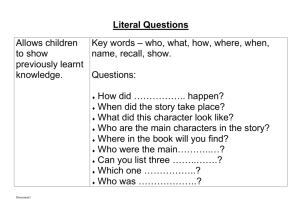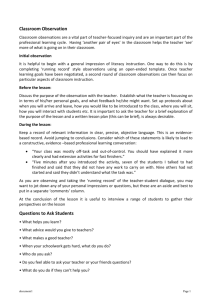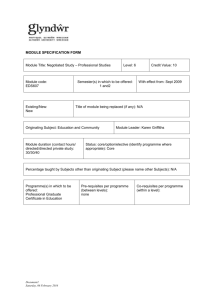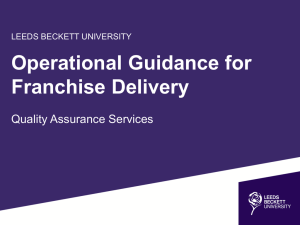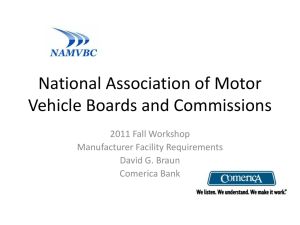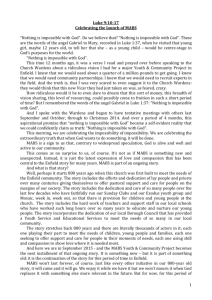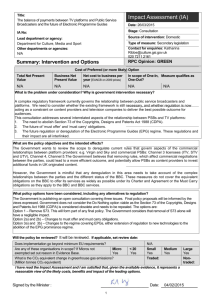AQH-I5 Models of Collaborative Provision - DocuShare
advertisement
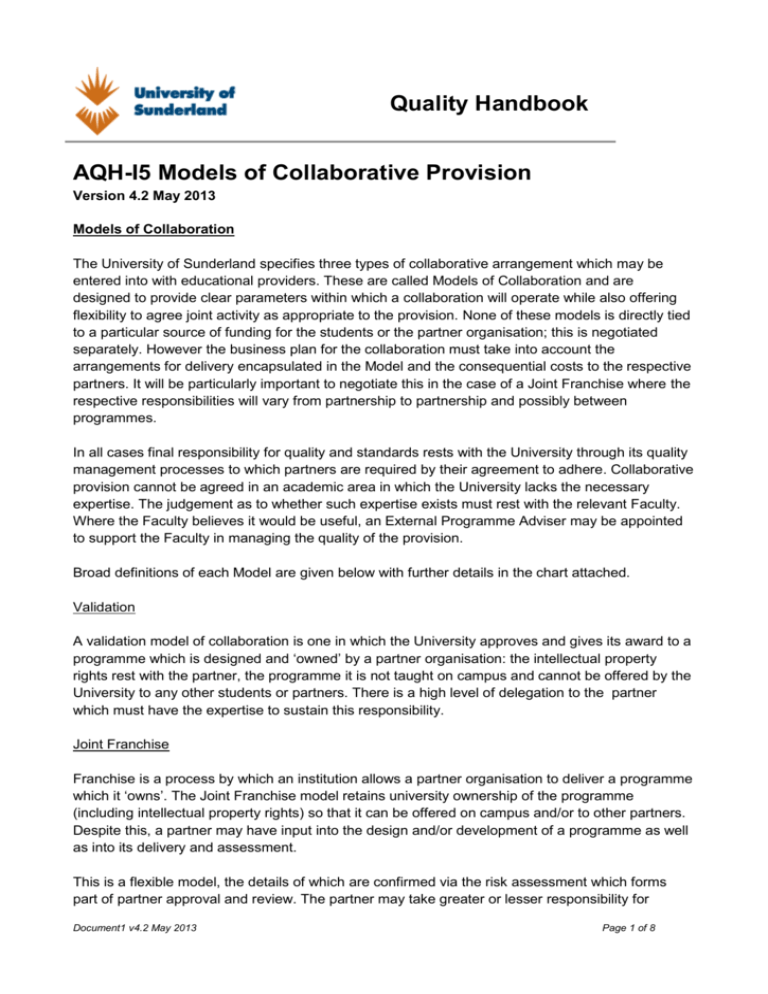
Quality Handbook AQH-I5 Models of Collaborative Provision Version 4.2 May 2013 Models of Collaboration The University of Sunderland specifies three types of collaborative arrangement which may be entered into with educational providers. These are called Models of Collaboration and are designed to provide clear parameters within which a collaboration will operate while also offering flexibility to agree joint activity as appropriate to the provision. None of these models is directly tied to a particular source of funding for the students or the partner organisation; this is negotiated separately. However the business plan for the collaboration must take into account the arrangements for delivery encapsulated in the Model and the consequential costs to the respective partners. It will be particularly important to negotiate this in the case of a Joint Franchise where the respective responsibilities will vary from partnership to partnership and possibly between programmes. In all cases final responsibility for quality and standards rests with the University through its quality management processes to which partners are required by their agreement to adhere. Collaborative provision cannot be agreed in an academic area in which the University lacks the necessary expertise. The judgement as to whether such expertise exists must rest with the relevant Faculty. Where the Faculty believes it would be useful, an External Programme Adviser may be appointed to support the Faculty in managing the quality of the provision. Broad definitions of each Model are given below with further details in the chart attached. Validation A validation model of collaboration is one in which the University approves and gives its award to a programme which is designed and ‘owned’ by a partner organisation: the intellectual property rights rest with the partner, the programme it is not taught on campus and cannot be offered by the University to any other students or partners. There is a high level of delegation to the partner which must have the expertise to sustain this responsibility. Joint Franchise Franchise is a process by which an institution allows a partner organisation to deliver a programme which it ‘owns’. The Joint Franchise model retains university ownership of the programme (including intellectual property rights) so that it can be offered on campus and/or to other partners. Despite this, a partner may have input into the design and/or development of a programme as well as into its delivery and assessment. This is a flexible model, the details of which are confirmed via the risk assessment which forms part of partner approval and review. The partner may take greater or lesser responsibility for Document1 v4.2 May 2013 Page 1 of 8 programme design and development, the development of teaching materials, and assessment depending on the partner’s strengths and the Faculty’s preferred mode of operation: in the case of a programme run with a consortium of partners, for instance, it would probably be inappropriate for different partners to have different levels of involvement. So, for example, a partner might have full engagement in design and development of the programme as well as in delivery and assessment, but equally the model would allow the University to retain responsibility for assessment while sharing programme development and the design of teaching and learning materials with the partner. The Quality Annex in the Agreement will state the detail of the respective responsibilities. A Joint Franchise partnership may develop so that the respective responsibilities of the partner and the University change over time. Such a development may be planned at the outset of the Agreement. Provided that it remains within the remit of a Joint Franchise, such developments may be approved by Faculty QMSC. The Faculty should then contact Academic Services to have the Quality Annex to the Agreement amended. Full Franchise Franchise is a process by which an institution allows a partner organisation to deliver a programme which it ‘owns’. The Full Franchise model is one in which the University not only holds the intellectual property rights, so that programmes can be offered on campus and/or to other partners, but also has sole responsibility for designing and developing the programme, providing teaching materials and setting and marking assessment. Partner involvement in Distance Learning and Flying Faculty. Where programmes by Flying Faculty or Distance Learning (DL) are provided by the University there is no collaborative element. However if a partner organisation is used overseas or elsewhere in the UK to support ‘flying faculty’ or DL arrangements, some form of agreement needs to be made to protect the students, the University and the partner in the event of problems with the relationship or difficulties in delivery. This may include a partner providing teaching space for our ‘flying faculty’ or library / IT access for DL students or by recruiting students. Issues which have to be covered in an agreement will typically include clarification of the requirements, a financial agreement, use of the University’s name and logo, and insurance. The assumption here is that no teaching or academic support is provided by the partner to the students and any teaching or support staff operating in-country are employed directly by the University. Agreements can be designed to meet the specific needs of the provision with the help of the University Solicitor. If the partner organisation provides any form of teaching support to students (including mentoring or support seminars) then it requires a full collaborative agreement. This would probably take the form of a Full Franchise agreement modified to take account of any teaching being delivered directly by University staff. If the agreement includes progression into the DL or ‘flying faculty’ programme from the partner organisation’s award then the policy on Articulation and Related Processes is applicable. Please consult Academic Services if you are in any doubt as to the status of DL or Flying Faculty work. Document1 v4.2 May 2013 Page 2 of 8 Responsibilities of the University and the Partner All the activities listed below are subject to University approval, monitoring and review as appropriate through its quality management processes. Activity / responsibility Validation Model Joint Franchise Model Full Franchise Model Design of the programme, ensuring the currency of the curriculum (ie informed by research and/or scholarship and/or contact with commerce/industry and/or practice-led as applicable) On-going development of the programme, ensuring the currency of the curriculum (ie informed by research and/or scholarship and/or contact with commerce/industry and/or practice-led as applicable) Prepare programme approval and periodic review paperwork Partner University and/or partner as appropriate and agreed University Partner University alone or with partner as appropriate and agreed University Partner To an appropriate standard, using University templates without support from the University beyond induction into our processes University University University University University University University University Partner, in line with University rules for on-campus provision Partner with University involvement in line with agreed processes Partner University University Partner with University involvement in line with agreed processes Partner with University involvement in line with agreed processes University and/or partner as appropriate and agreed; however it would be expected that the partner University Undertake approval and periodic review of the programme(s) to explore the scope of the programme including alignment with university expertise and UK requirements Undertake approval and periodic review of the partner Approve minor modifications to programmes and modules Responsible for in-country accreditation Develop, design and prepare teaching and learning materials appropriate to the programme and the student cohort(s) Document1 v4.2 May 2013 Page 3 of 8 would have a significant input into this Deliver teaching and learning materials and provide academic advice and support to students Develop student handbooks Partner Partner Partner Partner writes and provides to students programme, module and college handbooks University writes programme and module handbooks; partner customises with local information as applicable. Partner writes college handbook. Partner provides handbooks to students. Provide learning resources for students including a VLE, access to hard copy and electronic learning resources, IT and specialist equipment as appropriate Partner Provide personal support for students including adjustment for those with disabilities, careers guidance, pastoral support Design assessments Partner University provides core information for programme and module handbooks; partner adds local information as applicable which may include local variations on delivery and assessment. Partner writes college handbook. Partner provides handbooks to students. Partner The University also provides access for students and staff to its VLE and to online library resources. Any other provision agreed will be specified in the agreement. Partner University Approve assessments (examinations and coursework, including project / dissertation titles) before they are passed to students Undertake first and second marking and moderation of assessments. University assessment criteria must be adhered to. University University and/or partner as appropriate and agreed University University and/or partner as agreed. At the least, the University must moderate according to University policy and in addition to the external examiner. University undertakes all marking and moderation. University manages, chairs and hosts University manages all Manage the organisation and preparation of Document1 v4.2 May 2013 Partner Partner first and second marks; university moderates according to University policy and in addition to the external examiner. Partner manages and hosts Page 4 of 8 Partner The University also provides access for students and staff to its VLE and to online library resources. Any other provision agreed will be specified in the agreement. Partner University papers for Programme and Module Assessment Boards (PABs and MABs); liaise with the external examiner, chair PABs / MABs host the boards. (Combined Boards are treated as PABs.) Nominate and appoint the external examiner; respond to his/her reports; pay his/her fee and expenses Manage, chair and host Programme and Module Studies Boards (PSBs and MSBs) (Combined Boards are treated as PSBs.) Design a marketing plan and prepare publicity materials Materials to be approved by the University before publication / distribution Undertake student recruitment Carry out admissions to admissions requirements approved by the University and send offer letters Undertake annual review of the programme(s) using the University’s processes and templates, to the University’s deadlines Document1 v4.2 May 2013 PABs and MABs Partner liaises with external examiner over meeting arrangements Partner chairs MABs. University is not represented on MABs. University Centre Leader chairs PABs. University Partner is consulted about nominees and provides a draft response to the external for the University. Partner manages, chairs and hosts PSBs and MSBs. University is not represented on MSBs Centre Leader is a member of PSBs. Partner Partner Partner. The partner will provide to the University regular lists of all students made offers with their qualifications and, on request, a sample of application forms and offer letters. Partner undertakes annual review to the same process as that used on-campus and the Faculty considers it through its usual processes. PABs and MABs. University liaises with external examiner over meeting arrangements. Partner representation on PABs and MABs as agreed, typically Assistant Programme Leader. arrangements, chairs and hosts MABs and PABs. Partners are not represented. University nominates, appoints and pays. Partner is consulted about external examiners’ recommendations and responses as appropriate. University manages, chairs and hosts PSBs and MSBs. Partner representation on PSBs and MSBs as agreed, typically Assistant Programme Leader. University nominates, appoints and pays. Partner is informed about external examiners’ recommendations and University responses as applicable. University Partner is informed of developments and issues as applicable. Partner, although in some circumstances joint development with the University and/or between partners will be appropriate Partner University Partner Partner submits annual partner review form and contributes to programme review through the MSB / PSB Partner submits annual partner review form. University responsible for annual review of the programme through the PSB and informs partner of Page 5 of 8 Partner University Provide staff development including pedagogical development, subject-specific development and awareness of UK and University quality and standards requirements. Provide an agreed level of ‘expert’ input via guest lectures or similar events Ensure processes for student representation and feedback are in place. This must include a Student-Staff Liaison Committee at programme / subject level and use of questionnaires Responsible for student appeals Responsible for student complaints Responsible for student disciplinary matters Document1 v4.2 May 2013 outcomes. University and partner in collaboration. However the partner is expected to provide subjectspecific staff development for their own staff. Partner The University will provide an agreed amount of input but the staff development plan must be initiated, funded and implemented by the partner University – this is a requirement of the Validation Model University and partner in collaboration. However the partner is expected to provide subject-specific staff development for their own staff. University if appropriate and agreed Not applicable unless specifically agreed Partner Partner manages SSLCs University and partner develop and manage programme / module questionnaires via MSB / PSB. University Partner in the first instance with further court of appeal to the University in respect of issues relevant to the academic provision. Partner: students are subject to the partner’s rules, procedures and regulations governing conduct. Where a disciplinary matter has implications for academic quality or standards (eg assessment irregularities) the partner must refer this to the University. Where a disciplinary matter which is not academic in nature may result in the withdrawal of a student from a university programme the partner should make the university aware of this via the University Partner in the first instance with further court of appeal to the University in respect of issues relevant to the academic provision. Partner manages SSLCs University provides programme / module questionnaires which are managed in collaboration with the partner. University Partner in the first instance with further court of appeal to the University in respect of issues relevant to the academic provision. Partner: students are subject to the partner’s rules, procedures and regulations governing conduct. Where a disciplinary matter has implications for academic quality or standards (eg assessment irregularities) the partner must refer this to the University. Where a disciplinary matter which is not academic in nature may result in the withdrawal of a student from a university programme the partner should make the university aware of this via the Centre Leader, and provide any information requested to support the withdrawal. Partner: students are subject to the partner’s rules, procedures and regulations governing conduct. Where a disciplinary matter has implications for academic quality or standards (eg assessment irregularities) the partner must refer this to the University. Where a disciplinary matter which is not academic in nature may result in the withdrawal of a student from a university programme the partner should make the university aware of this via the Centre Leader, and provide any information requested Page 6 of 8 Consider partner staff cvs taking into account the expertise of individuals and the balance of expertise across the staff team Provide a Centre Leader who will act as the primary over-arching link with the partner Determine whether an external programme adviser would be of use, and if so, make a suitable appointment and ensure his/her involvement as appropriate Provide transcripts Provide parchments Provide statistical data on student admission, progress, completion and achievement Document1 v4.2 May 2013 Centre Leader, and provide any information requested to support the withdrawal. University to support the withdrawal. University University University University University University Not normally applicable, but University if required Not applicable Partner University Partner University University University University University University Page 7 of 8 Version History Version Occasion of Change Change author Modifications made S Sutcliffe Date of modification September 2008 1.0 Original placed in Academic Quality Handbook Changes to reflect the University’s new collaborative processes, being implemented from September 2009 C Gardner August 2009 Text reviewed and amendments made. Changes to reflect Service name Review approved by Academic Board S Patience November 2010 ISS to SLS B Ollerenshaw September 2011 Complete new definition 4.1 B Ollerenshaw September 2011 Responsibilities grid added 4.2 B Ollerenshaw May 2013 Disciplinary action added to responsibilities grid 2.0 3.0 4.0 Document1 v4.2 May 2013 Mainly references to new University structure Page 8 of 8

